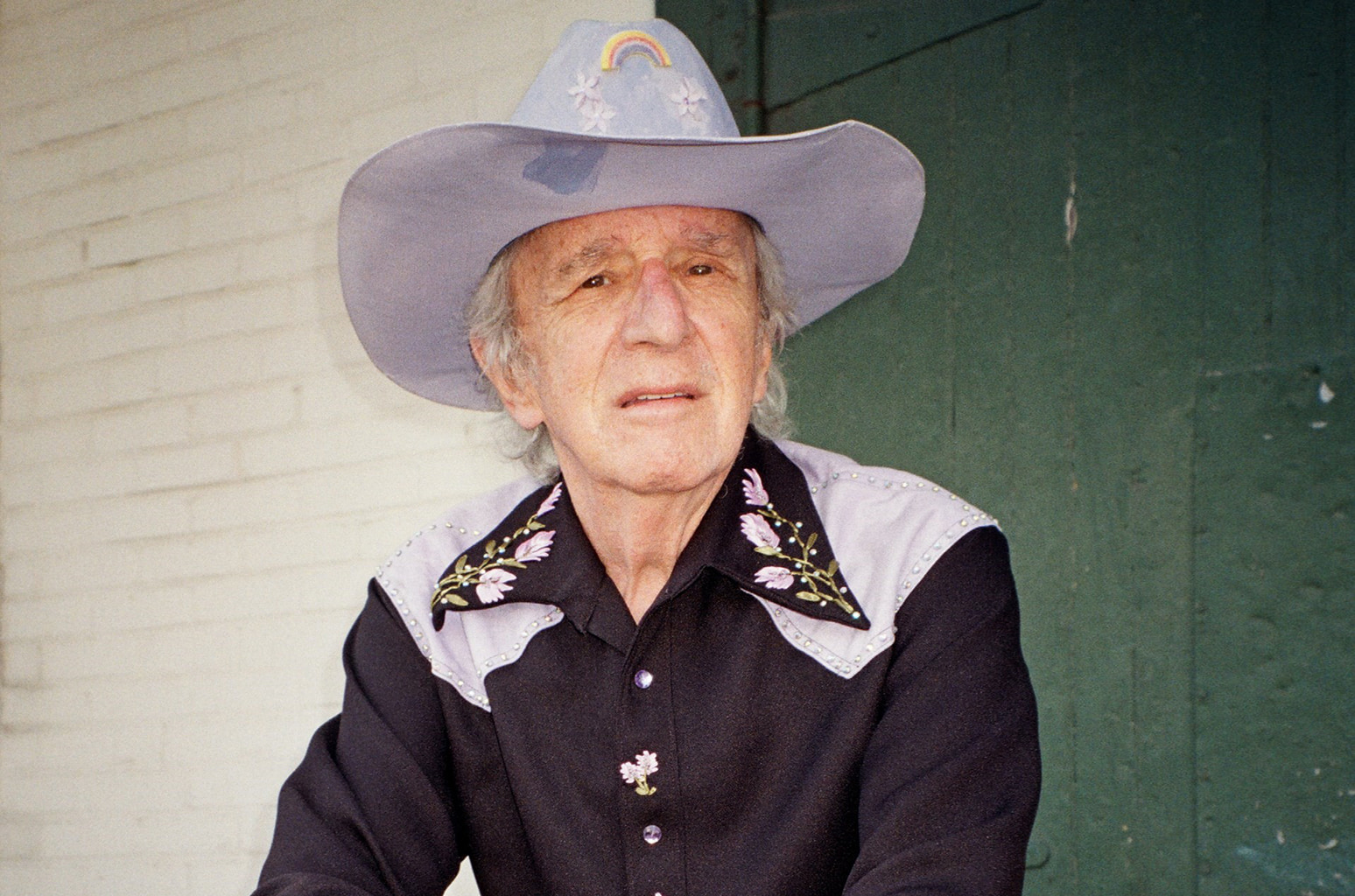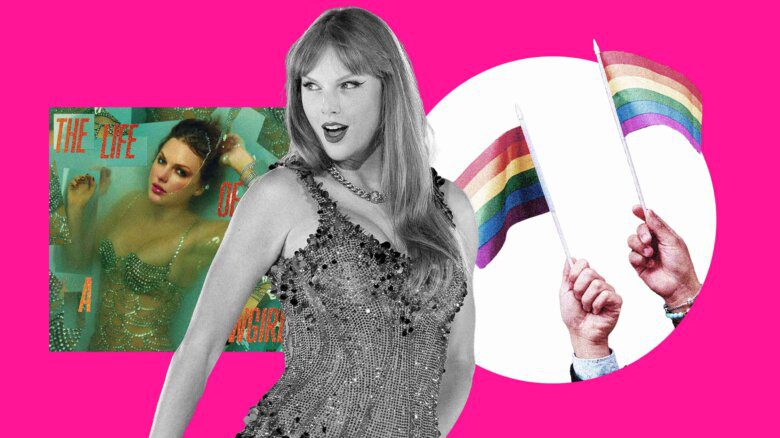Patrick Haggerty has thumbed his nose at Nashville’s conservative values since day one. As the feisty voice of Lavender Country, his band’s astonishing 1973 debut LP is widely acknowledged as the first country music album foregrounding the challenges and intimate lived experiences of an openly gay man.
Raised on a dairy farm in the Pacific Northwest where Hank Williams songs were used to soothe cows, Haggerty has shared the story of his kindhearted father who supported him for who he was, encouraging him to try out as a cheerleader with glitter on his face. Joining the cause of liberation in the immediate aftermath of Stonewall, Haggerty would go on to become a socialist political candidate, working side by side with the Nation of Islam on a Black/gay unity platform. Listening to Lavender Country’s 50-year-old self-titled album, it is striking just how trenchant, tender and true these songs sound today.
“In the years before I made the album, I was conflicted,” Haggerty says during a Zoom call from his home in Bremerton, Washington. “I could stay in the closet, move to Nashville and try to do something in country music. Or, I could be a screaming Marxist bitch and come out!
“It was unthinkable to do both,” he continues. “I had to make a choice, so I did. There was some regret in that choice, because I love country music and I’m kind of a hambone onstage. I might have been able to make something happen if I had snuck back into the closet. It just wasn’t in the cards. It wasn’t me.”
At age 78, Haggerty is now returning to the path less travelled with a follow-up album that eclipses the typical notions of “long awaited.” Blackberry Rose and Other Songs and Sorrows was initially released independently in 2019, and is currently receiving a wide-scale reissue this week from Don Giovanni Records, the New Jersey label known for championing radical Black artists as well as international punk acts.
This edition of Blackberry Rose was announced with a full-band re-imagining of the classic Lavender Country tune, “I Can’t Shake the Stranger Out of You.” The song was recently given another makeover when it was covered by RuPaul’s Drag Race champion Trixie Mattel in collaboration with Haggerty. During an interview with NPR, Mattel described her inspirations behind releasing “an homage to those who paved the way,” and the lessons she learned by singing with one of them.
“I’m like, ‘I’m worried about selling my record. It’s my third record and I hope people like it! I hope they buy it!’” said Mattel. “And he [Haggerty] reality checked me so hard. He was like, ‘Really? Cause I had friends be murdered by police for being gay and no one said anything.’ It was a very enriching experience, because Patrick reminded me that there’s more of a mission to this than getting likes and making money.”
Talking with Haggerty, he immediately makes it clear that he’s content with the hand life has dealt him, even if there have been setbacks in his path. “We’re fine, we’re old, we’re COVID-19-free, so we’re happy,” he says, while adjusting his one working hearing aid. “The goddesses are laughing. At first they said, ‘We’re going to give you the musical opportunity of a lifetime.’ Then two days later they decided to take my hearing.”
Haggerty is no stranger to overcoming challenges. As a first generation liberation activist, he explains how gay and lesbian members of the Seattle Stonewall community worked together to release Lavender Country’s debut. “We had to raise the money, buy the studio time, find the musicians and sell the album out of a post office box by ourselves,” Haggerty says. “It’s not something I could have ever done alone, and I think that’s a really important part of the Lavender Country story. I’m a communist, and it was a communal effort.”
“Nobody would play with me. I didn’t have an opportunity to do Lavender Country or any other kind of music because I had a scarlet letter on my back.”
Despite their success at gaining a grassroots following, selling all 1,000 copies of the original album during a series of early 1970s tours up and down the West Coast, there were forces at work against Lavender Country. One of the most notorious events from this era found Seattle DJ Shan Ottey dismissed from her job at a commercial radio station and stripped of her broadcasting license just for playing the band’s song “Cryin’ These Cocksucking Tears.”
After members of the group stepped away from Lavender Country to focus on personal lives and professional careers, Haggerty says he was effectively blacklisted, unable to find new collaborators. “For decades, even in movement circles, I was the one who made that queer country album, which was considered completely esoteric and outrageous,” he says. “Because I had that label, nobody would play with me. I didn’t have an opportunity to do Lavender Country or any other kind of music because I had a scarlet letter on my back.”
“To do a campaign as a gay socialist with men from the Nation of Islam was outrageous!”
As alternative forms of action during the 1980s, Haggerty co-founded the Seattle chapter of AIDS-advocacy organization ACT UP, and ran two campaigns for political office with the New Alliance Party. The NAP is best known today for boosting psychologist Lenora Fulani onto the ballot in all 50 states during her 1988 presidential run, making her both the first African-American and woman to do so. This forged Haggerty’s connection with the Nation of Islam, led locally by a progressive Seattle minister who Haggerty describes as being “quite interested in making connections to the gay movement.
“To do a campaign as a gay socialist with men from the Nation of Islam was outrageous!” Haggerty laughs. “I didn’t particularly set out to be outrageous, but I ended up there, and that term has followed me around for my whole life. The campaign worked out pretty well, and I really liked those guys, so we managed to cut a swath. I think we got between 16 and 18 percent of the vote. That was a good showing and it was worth doing.”
Another song on Lavender Country’s new album is dedicated to his comrade Clara Fraser, the feminist political organizer who co-founded the Freedom Socialist Party. Haggerty sings from the point of view of a man who fired her, reading quotes verbatim from a case file that he gained access to while working in her office’s human rights department. “If you want to talk about authenticity, this song really is,” he says. “Every quotation and action that I sing about in that song was perpetrated by the yahoo who fired her.”
Elsewhere on Blackberry Rose, Haggerty breathes new life into “Gay Bar Blues,” a staple of the band’s performances in the 1970s that was initially earmarked for their debut. “Gay bars back then were crummy holes in the wall that you had to sneak into,” he says. “It was very well received because the people who were hearing it in 1973 were coming out of that darkness.” The band’s Tammy Wynette parody, “Stand On Your Man,” similarly dates back 20 years, but it’s been updated for the modern age with a reference to the “lapsed judgment” of Trump-supporting Republicans.
“I never stopped writing,” says Haggerty. “For the 50 intervening years, I had scraps of paper sitting under my bed and on top of my dresser with notes about songs I was moved by. They piled up over time, so the album is a collection of scribblings from my life. Not only is it advertised as being 50 years in the making, but that’s the literal truth.”
Looking back at his life and career decisions, Haggerty remains proudest of the fact that he never compromised his creative intentions. As queer country artists now gain mainstream acceptance and commercial viability, he sees these “morphing attitudes” as a clear example of the Marxist theory of dialectical materialism. “I was persona non grata for 40 years, and it turned into its opposite, big time,” says Haggerty. “After all these years, I’m now being rushed by essentially the same forces that excluded me in the first place.”
Beyond his collaboration with Trixie Mattel, Haggerty has shared stages and interviews with Orville Peck. They’ve made different choices, but Haggerty still takes his hat off to the masked cowboy crooner. “Orville found a way to go big time by being not so pithy in terms of his politics,” he says. “He’s really good at what he does, and has the right team behind him. When you find out what’s going on behind the mask, he’s much more inclined to agree with me than with the Democratic Party.”
The modern-day queer country artist who Haggerty truly holds in high regard is the devil-seducing superstar Lil Nas X: “If you want to talk about outlandish, he does that really well. Your first take on him is to laugh at the outlandishness, but just under the surface is a very serious artist, politically and in every other way.
“All kinds of things are possible now,” Haggerty concludes, “but if I could do a show with Lil Nas X, I could die and go to hell and be very happy.”


 Why you can trust Xtra
Why you can trust Xtra


